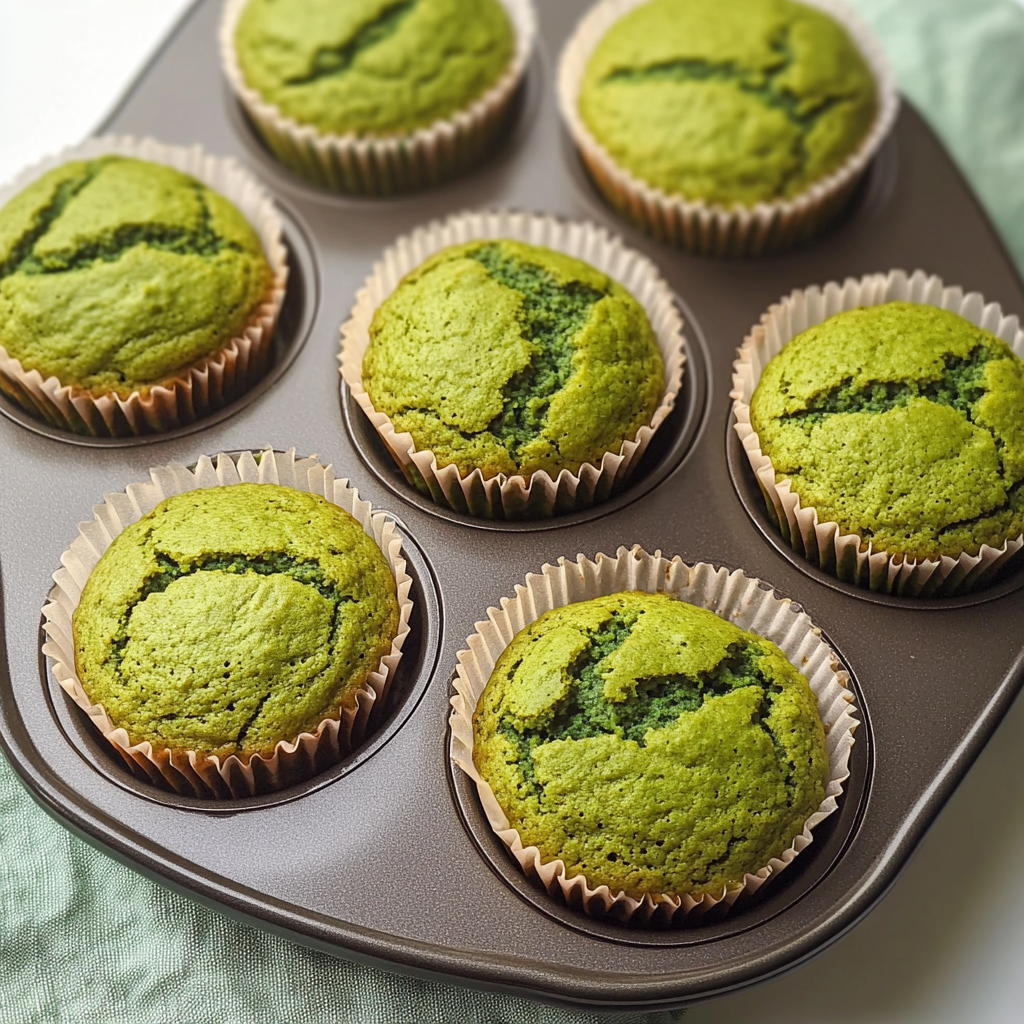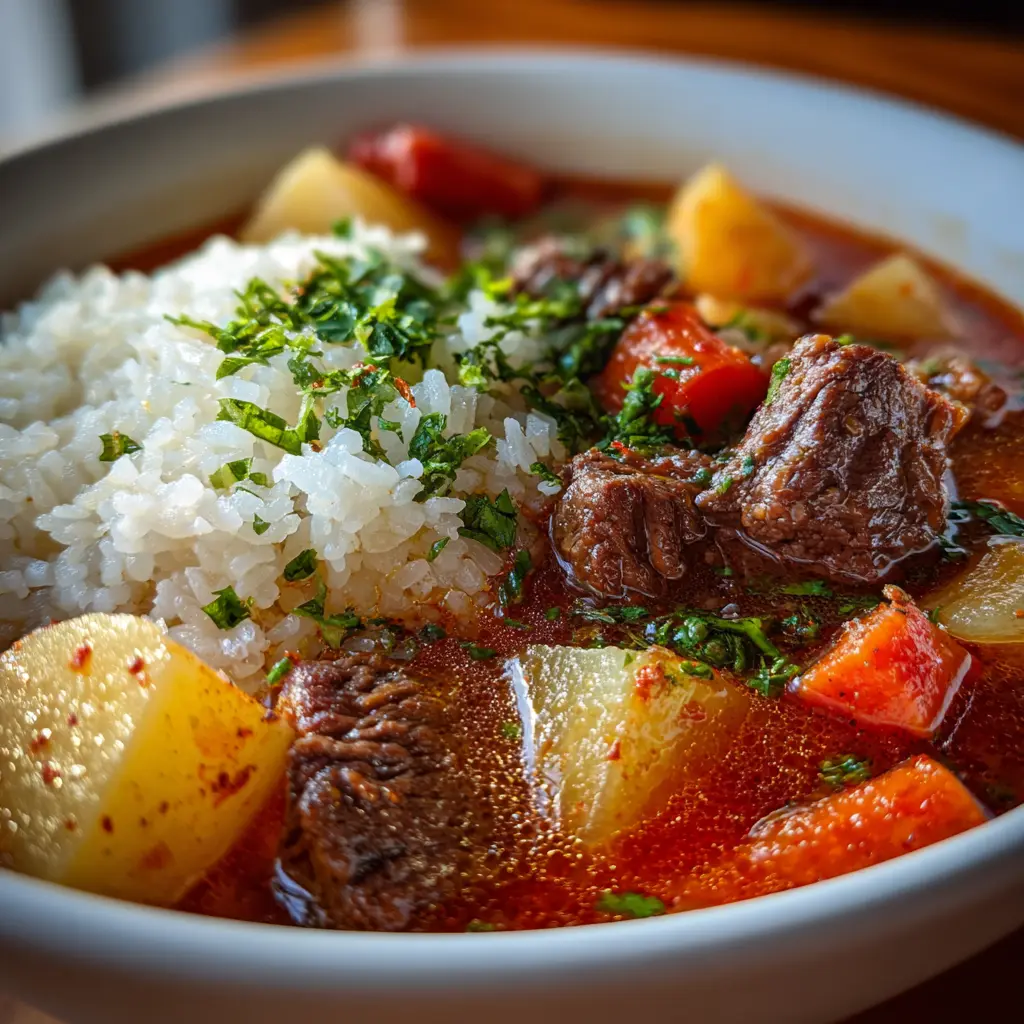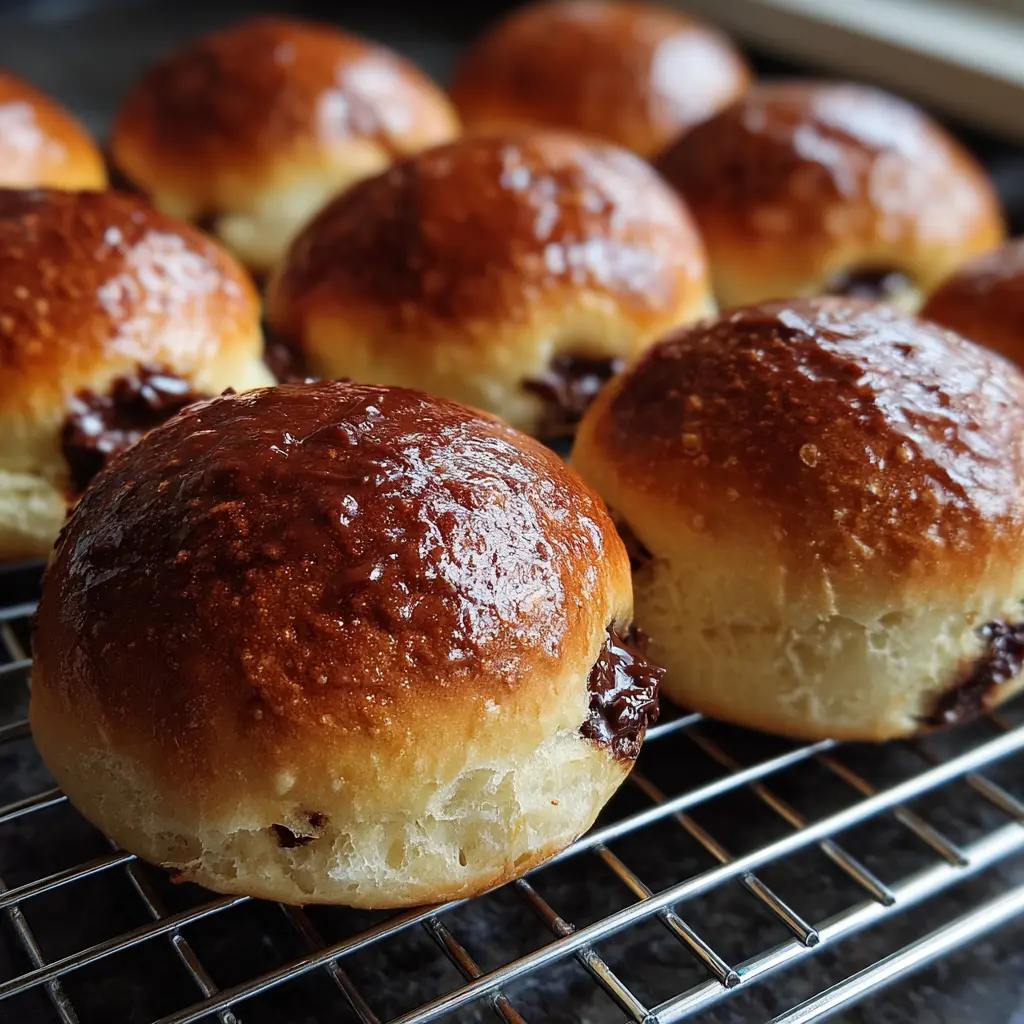Matcha muffins with almond flour are more than just a colorful treat—they’re a powerhouse of flavor, nutrition, and texture. With their vibrant green hue, earthy flavor, and gluten-free foundation, these muffins combine the superfood qualities of matcha with the wholesome benefits of almond flour. Whether you’re a seasoned baker or just dipping your toes into healthier dessert options, this guide will walk you through everything from health benefits and ingredients to baking techniques, customization ideas, and storage tips. You’ll also find answers to commonly asked questions to ensure you get the perfect batch every time.
The Rising Popularity of Matcha in Baking
Over the past decade, matcha has exploded in popularity. No longer confined to traditional Japanese tea ceremonies, this finely milled green tea powder is now a favorite in cafés, smoothies, and baked goods worldwide. Its bright green color makes it visually appealing, but what truly sets matcha apart is its unique flavor—a harmonious blend of bitterness and sweetness.
In baking, matcha offers more than just color. It contributes antioxidants called catechins, especially EGCG (epigallocatechin gallate), known for boosting metabolism and fighting inflammation. When used in a matcha muffin recipe with almond flour, it transforms a typical snack into a nourishing bite with a caffeine kick that’s smoother than coffee.
Why Almond Flour is a Healthy Gluten-Free Alternative
Almond flour has earned its place as a staple in gluten-free baking, and for good reason. Made from blanched, finely ground almonds, this flour is naturally gluten-free and grain-free. It has a mild, nutty taste and a rich, moist texture that makes it perfect for baked goods.
When combined with matcha, almond flour helps create muffins that are not only delicious but also packed with protein, healthy fats, and fiber. Unlike all-purpose flour, almond flour won’t cause sudden blood sugar spikes, making it ideal for low-carb diets or those managing diabetes.
For anyone seeking gluten-free alternatives without sacrificing taste or texture, almond flour is a winning choice. Pairing it with matcha takes the health benefits to the next level—antioxidants, good fats, and flavor all in one muffin.
Health Benefits of Matcha Muffin and Almond Flour
Matcha in Baked Goods: Is It Still Healthy?
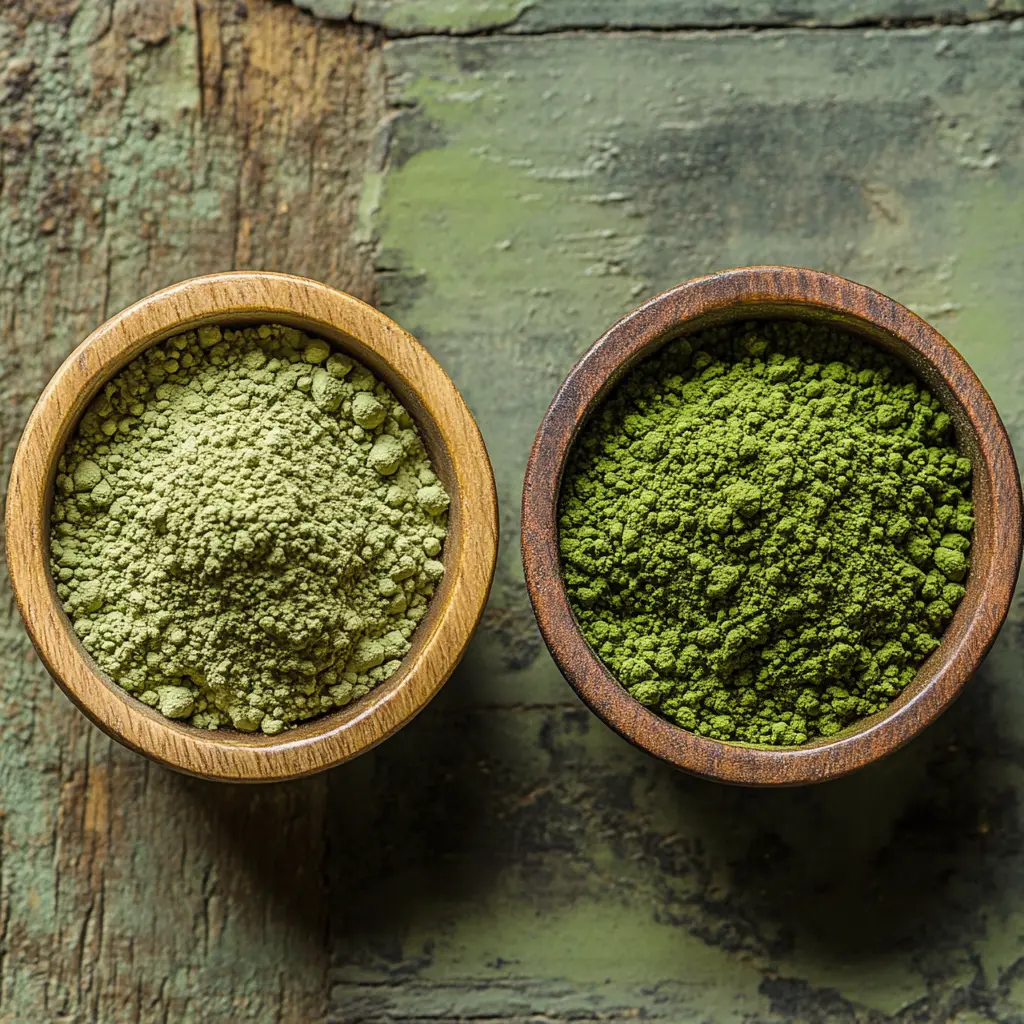
Matcha is known for being a nutritional powerhouse, thanks to its high concentration of antioxidants—particularly catechins like EGCG. But is baking with matcha still healthy? The answer is yes, with a slight caveat. While some antioxidants may degrade at high temperatures, many of matcha’s beneficial compounds remain intact during baking.
Using matcha in baked goods, especially in a matcha muffin recipe with almond flour, adds a layer of flavor complexity and nutrition. Matcha contributes L-theanine (for mental focus), a light caffeine boost, and anti-inflammatory properties.
According to the National Center for Complementary and Integrative Health, the catechins in green tea—especially EGCG—may offer modest benefits like reducing LDL cholesterol and supporting metabolic health, making matcha a smart addition to nutritious baked goods.
Can you drink matcha for baking? Not ideally. It’s better to use culinary-grade matcha powder, which is crafted specifically for cooking and baking. Drinking matcha is great, but for baking, stick with the powder.
Does matcha lose its benefits when cooked? Slightly, but it still retains a significant amount of antioxidants, especially when baked at moderate temperatures like 350°F. You’ll still enjoy health perks in every muffin bite.
What Makes This Matcha Muffin Recipe Special
Texture and Flavor Benefits of Almond Flour in Muffins
One of the standout qualities of this matcha muffin recipe with almond flour is its exceptional texture. Almond flour is naturally rich in fat and moisture, giving the muffins a soft, tender crumb. Unlike traditional wheat flour, which can produce dry or dense results, almond flour keeps baked goods moist for longer and provides a delicate, melt-in-your-mouth consistency.
But almond flour doesn’t just affect texture—it brings a subtle, nutty sweetness that beautifully complements matcha’s earthy tones. When combined, they create a flavor that’s balanced, nuanced, and far from the ordinary.
Does almond flour make a difference in baking? Yes, it absolutely does. It not only improves moisture retention but also adds a unique depth of flavor that elevates even the simplest recipe.
Visual Appeal and Taste of Matcha in Baked Goods
Matcha’s vibrant green color gives these muffins a stunning visual appeal. But it’s more than just pretty—matcha introduces an earthy richness with a hint of bitterness that adds complexity to sweet bakes.
What happens if I use almond flour instead of all-purpose flour? You’ll get a moister, denser muffin with a nuttier taste. However, almond flour lacks gluten, so structure and rise might differ.
Why is my almond flour muffins not rising? This usually happens due to the absence of gluten and overmixing. Use fresh baking soda/powder, and avoid overworking your batter to help them rise better.
Can I substitute almond flour for regular flour in muffins? Yes, but it requires some adjustments. Almond flour absorbs more moisture and lacks elasticity, so you’ll need more eggs or binders and possibly reduce the liquids.
What is the trick to baking with almond flour? Always:
- Use recipes designed for almond flour
- Don’t pack the flour when measuring
- Combine with eggs or flax eggs for structure
- Avoid overmixing
- Let the batter rest a few minutes before baking
Ingredients & Baking Tools Checklist
Essential Ingredients for Matcha Muffin Recipe with Almond Flour
To make delicious and fluffy muffins, your ingredient choices matter. For the perfect matcha muffin with almond flour, here’s what you’ll need:
| Ingredient | Purpose |
|---|---|
| Almond Flour | The gluten-free base, provides nutty flavor and moisture |
| Culinary-Grade Matcha Powder | Adds color, antioxidants, and earthy taste |
| Eggs | Binds ingredients and supports rise (flax eggs for vegan option) |
| Baking Soda & Baking Powder | Creates lift and fluffiness |
| Sweetener | Coconut sugar, honey, or monk fruit for a healthier touch |
| Melted Butter or Coconut Oil | Moisture and richness |
| Vanilla or Almond Extract | Enhances flavor depth |
| Salt | Balances sweetness and enhances taste |
| Optional Add-ins | Chopped nuts, chocolate chips, coconut, or sesame seeds |
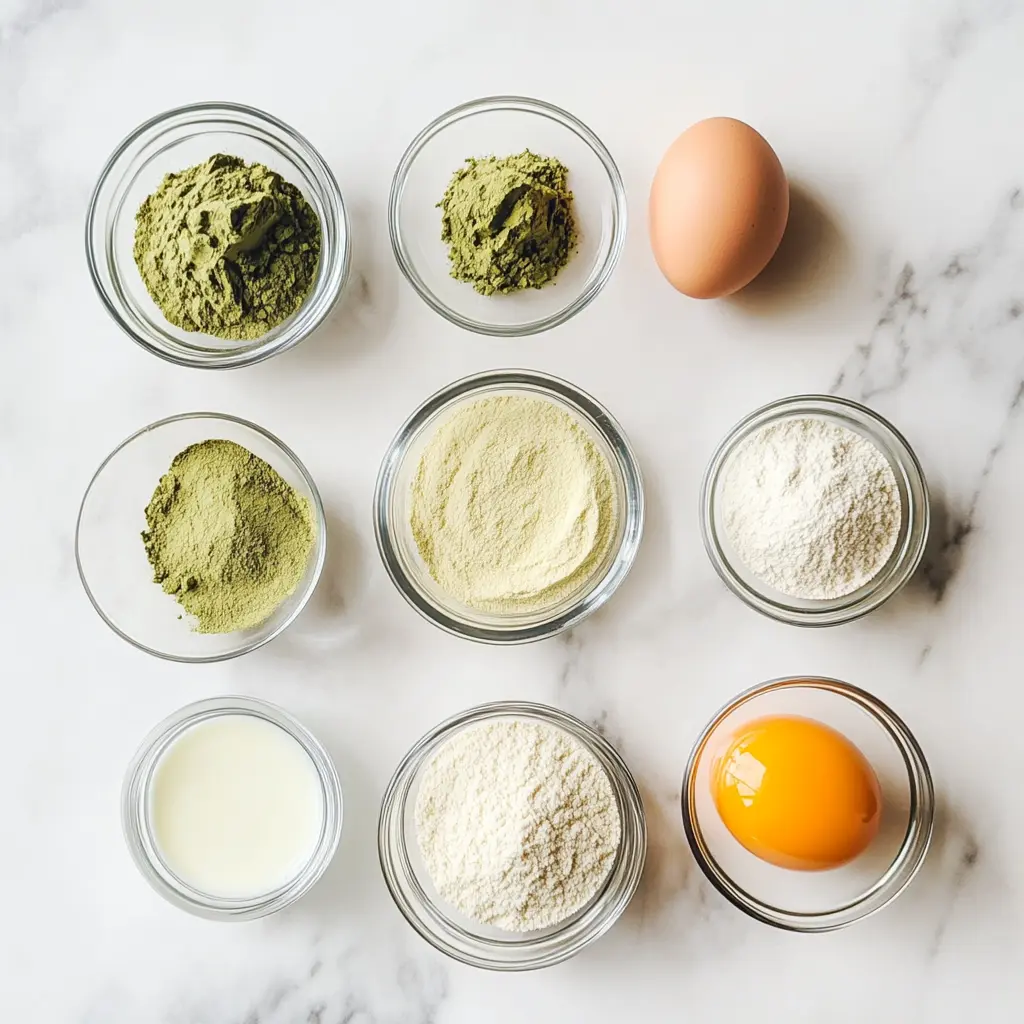
How much almond flour equals 1 cup of all-purpose flour? Generally, use a 1:1 ratio by volume but reduce liquid and increase eggs. Almond flour is heavier and moister, so adjust for texture.
Why can’t you use baking powder with almond flour? Actually, you can. Just make sure it’s aluminum-free—some believe aluminum reacts with acidic ingredients like matcha and alters flavor.
Research from the Harvard T.H. Chan School of Public Health highlights that almonds are rich in monounsaturated fats, fiber, and essential micronutrients, and may support heart health and satiety—key reasons why almond flour is a smart baking choice.
Step-by-Step Matcha Muffin Recipe with Almond Flour
Prepping the Batter and Ingredient Measurements
Creating the perfect matcha muffin with almond flour starts with precise measurements and proper prep. Almond flour is moisture-rich and heavy, so using the right ratio is essential to achieve the perfect light yet moist texture.
Step-by-step preparation:
- Preheat oven to 350°F (175°C) and line a standard 12-cup muffin tin with paper liners.
- Sift dry ingredients in a large bowl:
- 2 cups almond flour (finely ground)
- 1½ tablespoons matcha powder (culinary grade)
- ½ teaspoon baking soda
- ½ teaspoon baking powder
- Pinch of salt
- In a separate bowl, whisk wet ingredients:
- 3 large eggs (room temperature)
- ⅓ cup melted coconut oil or butter
- ½ cup coconut sugar or sweetener of choice
- 1 teaspoon vanilla extract
Optional additions:
Mix in ¼ cup of chopped walnuts, white chocolate chips, or shredded coconut if desired.
- Combine wet and dry ingredients gently using a spatula. Avoid overmixing, which can lead to dense muffins. Let the batter sit for 5 minutes—this allows the almond flour to absorb moisture and thicken naturally.
Pro tip: If your batter seems too thick, add 1–2 tablespoons of unsweetened almond milk to loosen it slightly.
Baking Instructions and Optimal Temperature for Matcha Muffin
- Divide the batter evenly among the 12 muffin cups—each should be filled about ¾ full.
- Bake for 18–22 minutes, depending on your oven. Insert a toothpick into the center; if it comes out clean or with a few moist crumbs, they’re done.
- Allow muffins to cool in the tin for 5 minutes, then transfer to a wire rack to cool completely.
| Step | Action |
|---|---|
| 1 | Preheat oven & prep muffin tin |
| 2 | Sift & mix dry ingredients |
| 3 | Whisk wet ingredients separately |
| 4 | Fold wet into dry—avoid overmixing |
| 5 | Fill muffin cups ¾ full |
| 6 | Bake at 350°F for 18–22 mins |
| 7 | Cool and enjoy |
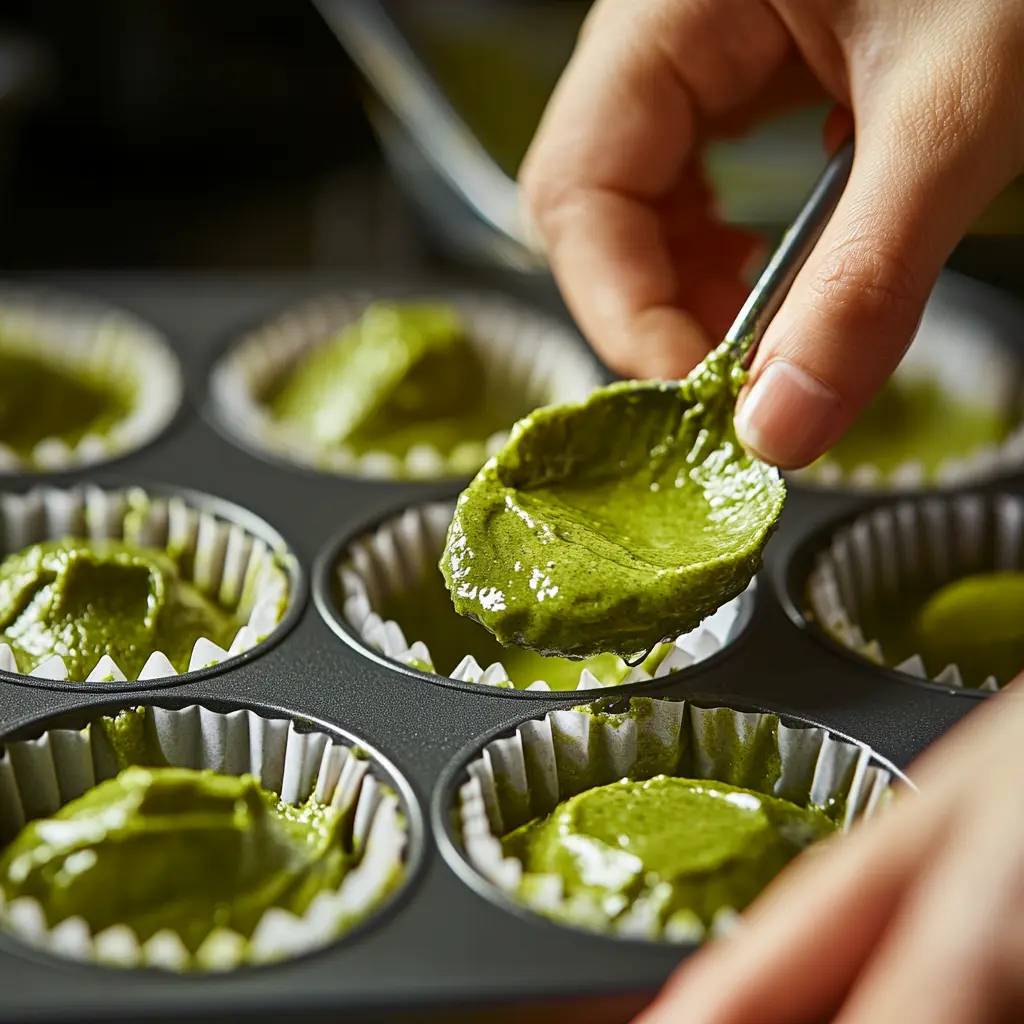
This easy and nutrient-rich matcha muffin with almond flour results in perfectly moist muffins with a subtle earthy flavor and a lovely green hue. Ideal for breakfast, snacks, or post-workout treats.
Customizing Your Matcha Muffins
Dairy-Free and Vegan Adaptations
The beauty of a matcha muffin with almond flour lies in how easily it can be adapted to meet various dietary preferences—especially dairy-free and vegan diets.
To make dairy-free matcha muffins:
- Replace butter with coconut oil or a plant-based butter alternative.
- Use unsweetened almond milk instead of regular milk if you’re loosening the batter.
For a vegan version:
- Replace each egg with a flaxseed egg (1 tbsp ground flaxseed + 3 tbsp water, mixed and rested for 10 minutes).
- Ensure your sweetener is vegan-friendly (e.g., maple syrup or organic cane sugar).
These substitutions will maintain the structure, texture, and taste of the muffins while keeping them plant-based and just as satisfying.
Can I bake with almond flour instead of regular flour in vegan recipes?
Yes, almond flour works well in vegan baking when paired with binders like flaxseed, chia seeds, or applesauce to make up for the missing egg structure.
Optional Mix-Ins and Fun Topping Ideas
Want to make your matcha muffin with almond flour even more exciting? Try these variations:
Flavor Boosters:
- ½ tsp ground cinnamon or cardamom for a warm twist
- A splash of almond or coconut extract
- Zest from a lemon or orange for citrusy brightness
Toppings and Texture Add-ins:
- Black sesame seeds: Add crunch and an Asian-inspired aesthetic
- White or dark chocolate chips: Create a sweet contrast with the earthy matcha
- Shredded coconut: Adds chewiness and mild sweetness
- Chopped nuts: Almonds, pistachios, or walnuts for healthy fats and a crunchy texture
Serving Tip:
Pair these muffins with your favorite green tea, almond milk latte, or matcha smoothie for a cohesive flavor profile.
Don’t miss our Moon Spell Cookies for another creative recipe featuring flavorful flour alternatives and magical presentation.
Common Mistakes and Troubleshooting Tips
Avoiding Dense or Dry Muffins
One of the most frequent complaints when baking with almond flour is that muffins turn out either too dense or too dry. This is typically due to how almond flour interacts with other ingredients.
Why is my almond flour muffins not rising?
Unlike all-purpose flour, almond flour lacks gluten, which provides structure and elasticity. If your muffins are falling flat:
- Make sure your baking soda and baking powder are fresh
- Avoid overmixing—stir just until combined
- Use enough eggs or a binding agent (like flaxseed or chia seed if vegan)
- Let your batter rest for 5–10 minutes before baking so the flour can hydrate
Why does almond flour not bake well in some recipes?
Almond flour has a high-fat content and absorbs moisture differently. If the recipe isn’t designed for almond flour, it may bake unevenly or collapse. That’s why you need a recipe—like this matcha muffin recipe with almond flour—that’s tailored for its unique properties.
Common error fixes:
| Problem | Likely Cause | Fix |
|---|---|---|
| Muffins too dense | Overmixing, low rise | Use fresh leaveners, don’t overmix |
| Muffins fall flat | Too much liquid, no binder | Add egg or flax egg, rest the batter |
| Muffins dry | Too much almond flour | Measure using spoon-and-level method |
| Greasy texture | Too much fat | Cut back on oil/butter slightly |
Accurate Measuring and Ingredient Freshness Tips
Precise measurements make or break your matcha muffin recipe with almond flour.
How to measure almond flour properly:
- Use the spoon-and-level method—not scooping directly from the bag
- Avoid compacting the flour which adds excess weight and dries out your batter
What’s a substitute for all-purpose flour in muffins?
Besides almond flour, other gluten-free alternatives include coconut flour, oat flour, and gluten-free all-purpose flour blends. Just keep in mind:
- Coconut flour is more absorbent, so use less and increase liquids
- Oat flour offers more density and fiber but less fat
- Blends often contain xanthan gum to mimic gluten’s structure
For foolproof results, stick to recipes developed for almond flour rather than trying to substitute directly into conventional muffin recipes.
Looking for another healthy and creative baking idea? Check out our Classic Date Nut Bread Recipe made with wholesome ingredients and fiber-rich nuts.
Nutritional Info & Serving Suggestions for Matcha Muffin
Macronutrients, Calories, and Healthy Snacking
One of the standout benefits of this matcha muffin with almond flour is how it delivers flavor, nutrition, and satiety—without refined flour or excessive sugar.
Here’s a breakdown of what you can expect in one standard-sized muffin (based on 12 muffins total):
| Nutrient | Approx. Value |
|---|---|
| Calories | 180–210 kcal |
| Protein | 6–7g |
| Fat | 15g (mostly unsaturated) |
| Carbs | 7–10g (depending on sweetener) |
| Fiber | 3g |
| Sugar | 3–5g (natural and added) |
These muffins are:
- Low in carbs compared to traditional flour muffins
- High in protein and healthy fats from almond flour and eggs
- Rich in antioxidants from matcha, especially EGCG
- Naturally gluten-free, suitable for celiac and gluten-sensitive diets
Best Pairings and Serving Times for Matcha Muffins
Whether enjoyed fresh out of the oven or stored for the week ahead, these muffins are incredibly versatile.
Perfect pairings:

- A cup of matcha latte or green tea
- Unsweetened almond milk for a creamy complement
- Greek yogurt with a drizzle of honey
- A handful of berries for a vitamin C boost
Best times to enjoy them:
- Breakfast on the go: nutrient-dense and energizing
- Afternoon snack: steady energy from healthy fats and protein
- Post-workout treat: carbs + protein combo for recovery
- Dessert: warmed and topped with almond butter or a dusting of powdered sugar
Storage Tips:
- Store in an airtight container at room temp for 2 days
- Refrigerate for up to 7 days
- Freeze (individually wrapped) for up to 3 months—just thaw and reheat!
Don’t miss our Greek Yogurt Parfait Recipes for a perfect side to these muffins or as a light alternative breakfast pairing.
FAQs About Matcha Muffin Recipe with Almond Flour
Can I use regular flour instead of almond flour?
Yes, but with major adjustments. Almond flour is gluten-free and higher in fat and moisture. If you swap in all-purpose flour 1:1 without modifying the recipe, the result will be dry and dense. You’ll need to increase the fat or add moisture. That said, the unique texture and flavor almond flour offers is a core part of what makes these muffins so special.
What’s the best type of matcha for baking?
Use culinary-grade matcha for baked goods. It’s more robust in flavor and cost-effective compared to ceremonial grade. Ceremonial matcha is smoother and better suited for beverages. Always look for a vibrant green color to ensure freshness and quality.
How do I store matcha muffins?
Let them cool completely, then:
Store at room temperature in an airtight container for up to 2 days
Refrigerate for up to 1 week
Freeze for up to 3 months, wrapped individually
To reheat, microwave for 15–20 seconds or warm in a toaster oven.
Are matcha muffins healthy?
Absolutely—especially this matcha muffin recipe with almond flour. They’re naturally gluten-free, low in carbs, and rich in antioxidants, protein, and healthy fats. By using almond flour and a natural sweetener, you avoid processed ingredients while still enjoying a delicious snack.
Can I make matcha muffins vegan?
Yes. Use flax eggs in place of regular eggs (1 tbsp ground flaxseed + 3 tbsp water per egg) and opt for coconut oil instead of butter. Almond milk also makes a great plant-based liquid for loosening the batter. The result? Still fluffy, flavorful, and nutrient-dense.
How long do matcha muffins last?
They last:
2 days at room temp
1 week in the fridge
3 months in the freezer
Be sure to store them in a sealed container to retain moisture and freshness. Always allow them to cool completely before storing to prevent sogginess.
Conclusion: Final Tips for Perfect Matcha Muffins
Using Fresh Matcha and Almond Flour for Best Results
To get the most flavor and nutrition out of your matcha muffin recipe with almond flour, always start with fresh, high-quality ingredients. Matcha powder should be vibrant green—dull or yellowish tones mean it’s stale. Almond flour should smell slightly nutty and be stored in a cool, dry place or the refrigerator to avoid spoilage due to its high fat content.
Experimenting with Flavor Combinations
This muffin base is incredibly versatile. Don’t be afraid to play with ingredients:
- Add dried blueberries, cranberries, or chopped apricots for a fruity twist
- Mix in mini chocolate chips or swirl in tahini or almond butter
- Sprinkle hemp seeds or chia for added texture and protein
- Top with a drizzle of honey or melted white chocolate for a dessert-style finish
Whether you’re baking for yourself or sharing with guests, these muffins are a beautiful blend of flavor, nutrition, and creativity.
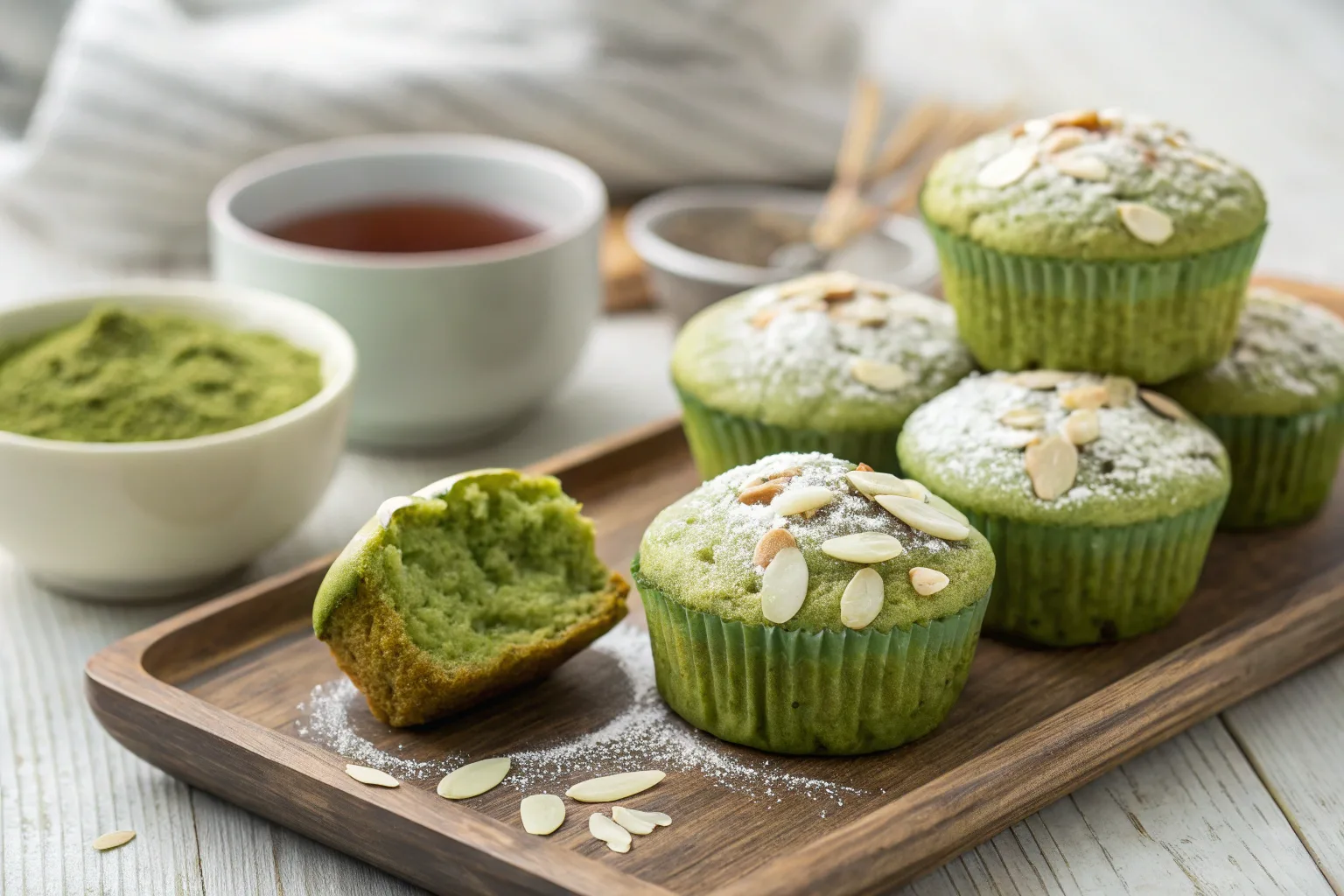
Gluten-Free Matcha Muffins with Almond Flour
Ingredients
Equipment
Method
- Prepare the Ingredients:
- Preheat the oven to 350°F (175°C).
- Line a 12-cup muffin tin with muffin liners or lightly grease with coconut oil.
- In a large mixing bowl, sift together almond flour, matcha powder, baking powder, baking soda, and salt.
- Mix the Wet Ingredients:
- In a separate bowl, whisk together eggs, honey (or maple syrup), melted coconut oil, almond milk, and vanilla extract until well combined.
- Combine Wet & Dry Ingredients:
- Slowly fold the wet ingredients into the dry ingredients. Mix gently until just combined—do not overmix, as this can lead to dense muffins.
- If using chocolate chips or nuts, gently fold them into the batter.
- Bake the Muffins:
- Divide the batter evenly among the 12 muffin cups, filling each about ¾ full.
- Optionally, sprinkle shredded coconut or additional chocolate chips on top.
- Bake for 18–22 minutes, or until a toothpick inserted into the center comes out clean.
- Cool & Serve:
- Let muffins cool in the tin for 5 minutes, then transfer them to a wire rack to cool completely.
- Enjoy warm with a cup of green tea or coffee for a delicious, healthy treat!
Nutrition
Notes
Vegan Alternative: Replace eggs with flax eggs (1 tbsp flaxseed meal + 3 tbsp water per egg).
Sweeter Muffins: Add an extra 1 tbsp of honey or maple syrup.
Extra Flavor: Add ½ tsp cinnamon or a pinch of nutmeg for a warm twist.
Storage Tips:
Store muffins in an airtight container at room temperature for 2 days.
Refrigerate for up to 1 week or freeze for up to 3 months. Reheat in the microwave for a fresh-out-of-the-oven taste!

